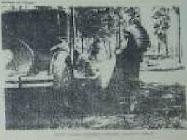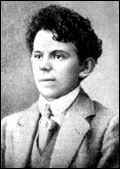Another vast curricular discourse from Ron Silliman, the Great Expatiator, makes me want to talk back, which I haven't felt like doing in a long time.
With Ron there is always this immense unexplored poetry turf, just waiting there, underneath the Quietude shrubbery, waiting for the Next Generation of Too Many Poets who Don't Know Enough. It's a curriculum for becoming Informed, in order to Know What Is Going On.
I think I come from a cultural background which is sort of midwestern-stoic, a culture which emphasizes understatement & brevity (believe it or not - & it may be hard to believe, considering the giant Blather-Bank which is HG Poetics). Say what you have to say, no more no less. Keep it brief.
This culture offers, in many ways, an inimical environment for the audacious flora which is Poetry. Yet it has its points. It produces great terse quiet writers like Willa Cather, Sherwood Anderson.
I think much beautiful art arises out of nostalgia for an imagined, remembered, childhood-fostered unity of culture. The reactionary tendencies of TS Eliot or Pound draw on it, but other arty characters, like Proust, for example, draw on it too. What is it, exactly? Montale points toward what I'm thinking about with his notions of "dilettantism" and "the second life of art." A certain vivid graceful place where art and life mutually enhance each other, without a lot of explanatory Cliff Notes.
My notion of midwestern understatement seems to chime with this other concept; that is, art makes itself manifest & speaks of and for those who really need it. It's a kind of (pseudo? super?) natural phenomenon, which in some sense renders anxieties about readership or transmission or canonicity or whatever - all these "middleman" issues - truly academic.
I'm sure I can be accused now of anti-intellectualism & know-nothingism. OK. But I believe art gets made by those with the talent to make it, out of their need to make it; and it is discovered & enjoyed by those who really need to discover it; and that this process begins not in grad school or even high school but in childhood - it's transmitted by the people who read & sing songs & tell stories to their children. I also don't think it's managed or controlled by intellectuals & academics, because the process of making and responding to art and poetry operates on its own level between producers and receivers.
I'm probably not expressing at all what I set out to try to express. I'm thinking of the place of poetry in life as something different, humbler, from that imagined by its intellectual supervisors in the academies & the publishing houses & outlaw-wannabee subcultures. Not that it's anti-intellectual, not at all : but it's a place, a sphere of activities, which is simply maintained (unsystematically, freely, adventitiously), in shared fashion, by those who know it & love it.
6.30.2006
Labels:
Midwest,
nostalgia,
quietude,
Ron Silliman,
social role2,
understatement
Subscribe to:
Post Comments (Atom)



No comments:
Post a Comment